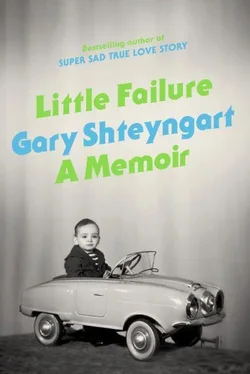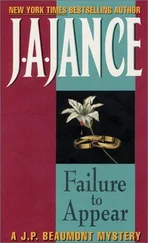And so I put on my little sailor’s outfit, knot the collar in the front, and pick up a child’s violin. Aunt Tanya teaches me how to strike the stringy thing, the what-do-you-call-it, against the body of the instrument. The pad against my cheek feels velvety and nice, and the sailor’s outfit, with its white tights and little shorts, is equally pleasant, but honestly I have no idea what the fuck I’m doing. The violin will give way to a less-esteemed instrument, the three-stringed Russian balalaika, which will eventually find its way into a dusty corner. In America, an elderly Russian gentlewoman, living next door to my grandmother, will try to inflict the piano upon me for five American dollars a lesson. None of it will leave an impression.

No, what I want to do is quite different. The violin’s dulcet wheezing is not for me (I have my own violin inside me, thank you), I cannot move my body like Cousin Victoria or holler from The Queen of Spades like my father: “Whaaaat is our life? A gaaaame!” If anything, I am more likely to explode like our Signal television set. I’m becoming a pathological reader. The first book, as I’ve mentioned above, concerns two children, a boy and a girl, who are shrunken down to the size of a kopeck and have to fend for themselves against giant mosquitoes and the like. The second book, the one responsible for everything else that has ever happened to me, is called The Wonderful Adventures of Nils and the Wild Geese . In the book, Nils, a bad boy prone to hitting the animals on his farm, is also magically shrunk down to a kopeck and then has to brave an adventurous life with the wild geese who carry him all over Sweden, to Lapland and back.
The Wonderful Adventures of Nils by Selma Lagerlöf — incidentally, the first woman to win the Nobel Prize in Literature — is a Swedish book, much loved in that country. It is no coincidence that the two books from which I learned how to read were both about small children shrunk to even smaller size and then forced into a hostile world. The lesson, at least to me, was clear: Bad boys don’t grow. And according to the All-Soviet Guide to Boys’ Development , which my mother studies religiously, with its diagrams of naked drawn boys of ever-ascending size with their ever-enlarging nutsacks, I am also not growing very well, in either corpus or sack. In every respect, I am a small thing full of limitations. When my aunt Tanya brings me my favorite ice cream, I get up and very seriously declare: “Thank you, but no. I am not allowed to eat it.”
In the Soviet Union The Wonderful Adventures of Nils is a fine book for a five-year-old, although in the United States the dense one-hundred-sixty-page volume would likely be assigned in fifth grade and, in some states, in college. The biggest regret of my childhood is missing the television airing of the 1950s Soviet adaptation of the book, called The Enchanted Boy . It is the first time I take a pencil to paper and, with the help of my father, write a letter to the broadcaster, Channel One, on the devilishly tiny-squared, graph-paper tetradka that every Russian child knows well.
Respected Channel One ,
I am a Leningrad boy, age 5. Last week you showed The Enchanted Boy. The Wonderful Adventures of Nils and the Wild Geese is my favorite book. I have read it so many times I have to use masking tape to hold it together. I cried when I found out you have already shown The Enchanted Boy. Please, please show it again. I really want to see it .
With respect ,
Igor Shteyngart, City of Leningrad
My father and I walk past the pharmacy, past the Lenin, to drop the letter into a mailbox. I feel very close to my father at the moment. Holding his hand, I am jumping up and down with excitement, even though I might get sweaty and sick from all the jumping. When we get to the mailbox, my father folds the piece of paper bearing my childish scrawl in half and throws it in, without postage or address. At the time, I both know and don’t know that the letter will never reach Channel One in Moscow. I am both hopeful and I know better than to be hopeful. But what does my father know? That the paramount state broadcaster will not reair the story of Nils and the geese just because a five-year-old boy with an insufficient nutsack demands it? Or that soon we will leave the country for good, and there will be no Channel One in the free world; there will be, eventually, seven holy channels in the New York metro area — channels 2, 4, 5, 7, 9, 11, and 13—and even more if we purchase a UHF bowtie.
Back on the Culture Couch in 1977, I am rereading Nils asthmatically, letting enough air into my lungs so that I may hear the actual words spoken aloud by me, imagining that they are being spoken aloud on the television set. My grandmother Galya joins me. I have two grandmothers. Grandma Polya, on my father’s side, likes to sit with me on our favorite bench in Moscow Square and feed me various meats. She will come with us to America and be my best friend for a long time. Grandmother Galya, unbeknownst to me, is slowly descending into vascular dementia. She is the main reason my mother doesn’t want to emigrate, and she will die in the Soviet Union in the late 1980s, barely sentient and in great pain. My aunt Tanya will stay behind and take care of her, a debt my mother will try to repay for the rest of her life.
Grandmother Galya used to work as a journalist and an editor at Evening Leningrad ( Vechernii Leningrad ). She knows of my love of Nils and the Wild Geese; she’s seen the lovingly applied masking tape holding together every volume of children’s literature I own. One day while babysitting me, she proposes: “Why don’t you write a novel?”
And so it begins. I am five years old with a thick, stubby pencil in my hand and a graph-paper tetradka waiting to be scribbled on. Grandmother Galya is smart. She raised herself up from the shtetl, took a gold medal in the local gymnasium, and schlepped her way to Leningrad to become a cultured person. She knows what every good editor knows well. You can’t just command “Write!” to your charges. There must be a reward system. Grandma Galya does not have access to the cold baked pork I love so well, but she does possess another important staple: cheese.
It is thick, hard, yellowish Soviet cheese, a poor relation of the megatons of orange lactose that the United States government will drop on my grandma Polya three years hence in Rego Park, Queens. But it establishes a pattern of exchange, goods for words, that has seen me through to the present day. Grandma Galya slices the cheese into dozens of pale yellowish squares. “For every page you write,” she says, “you will get a piece of cheese. And for every chapter you complete, I will make you a sandwich with bread, butter, and cheese.”
The resulting novel probably cost my grandmother a hundred pieces of cheese and at least a dozen cheese-and-butter sandwiches. No trace of it remains, but my childhood masterpiece likely began with these words:
Odin den’, utrom rano, Vladimir Ilyich Lenin prosnulsya .
One day, early in the morning, Vladimir Ilyich Lenin awoke.
Lenin is awake and alive in Leningrad! He has stepped off his pedestal in Moscow Square, and now it’s time for payback. At one point, before launching the October Revolution, he was hiding in a hunter’s cabin made of branches and straw (a proper Russian shalash ) in Finland. And to this day, Finland, while officially neutral, stubbornly remains outside the Union of Soviet Socialist Republics. In my sprawling novel, Lenin i ego volshebnyi gus’ ( Lenin and His Magical Goose ), this will be remedied forthwith.
Читать дальше













